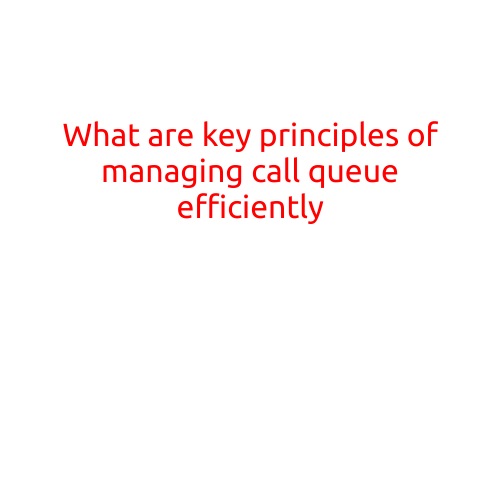
What are the Key Principles of Managing a Call Queue Efficiently?
Managing a call queue efficiently is crucial for businesses that receive a high volume of calls daily. A well-managed call queue ensures that customers are attended to promptly, reducing wait times and improving overall customer satisfaction. In this article, we will explore the key principles of managing a call queue efficiently.
1. Implementation of a Call Queue System
The first principle of managing a call queue efficiently is to implement a call queue system. A call queue system allows you to manage incoming calls, prioritize them, and route them to the most appropriate agent. This system can be manual or automated, depending on your business needs.
2. Prioritization of Calls
Prioritizing calls is essential to managing a call queue efficiently. You need to prioritize calls based on their urgency, customer importance, and the complexity of the issue. This ensures that critical calls are addressed promptly, and customers receive timely assistance.
3. Staffing and Scheduling
Staffing and scheduling are critical to managing a call queue efficiently. You need to ensure that you have adequate staff to handle the volume of calls, and that they are scheduled to work during peak calling hours. This ensures that customers are attended to promptly, reducing wait times and improving customer satisfaction.
4. Real-time Monitoring and Reporting
Real-time monitoring and reporting are essential to managing a call queue efficiently. You need to monitor your call queue in real-time, tracking metrics such as call volume, wait times, and abandon rates. This information helps you to identify bottlenecks and make data-driven decisions to improve your call queue management.
5. Effective Communication
Effective communication is crucial to managing a call queue efficiently. You need to communicate clearly with your agents, informing them of any changes to the call queue, and providing them with the necessary resources to handle calls. You also need to communicate with your customers, keeping them informed of their wait times and providing them with updates on the status of their call.
6. Call Routing and Distribution
Call routing and distribution are critical to managing a call queue efficiently. You need to ensure that calls are routed to the most appropriate agent, based on their expertise and availability. This ensures that customers are attended to by the right agent, reducing the risk of escalation and improving overall customer satisfaction.
7. Handling Abandoned Calls
Abandoned calls can be a major issue when managing a call queue. You need to have a plan in place to handle abandoned calls, such as calling customers back or providing them with alternative contact options. This ensures that customers receive the attention they need, even if their initial call is abandoned.
8. Continuous Improvement
Finally, continuous improvement is essential to managing a call queue efficiently. You need to continuously monitor your call queue, identifying areas for improvement and implementing changes to optimize your call queue management. This ensures that your call queue management process is always evolving, and that you are always able to provide the best possible service to your customers.
In conclusion, managing a call queue efficiently requires careful planning, effective communication, and continuous improvement. By implementing a call queue system, prioritizing calls, staffing and scheduling your agents, and continuously monitoring and reporting your call queue metrics, you can ensure that your customers receive the best possible service.





